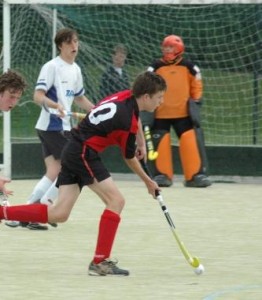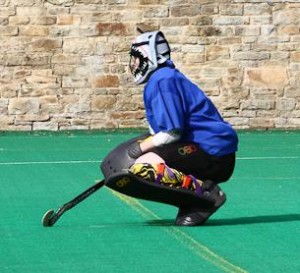The goalkeeper’s main job is obviously to stop the ball and if , it can be difficult. The ability to stop shots, according to sport psychology, depends on your “arousal level” (i.e. how awake and alert you are), which means that you have to be for the whole game, not just parts of it. That’s why it is often easier to play against a high scoring team who will put a lot of shots on goal; allowing you to get into the ‘zone’ and build up rhythm, and there are goalkeepers who succeed at facing a lot of shots on a team with poor defence. However, if you face a small number of shots during the whole game, which are also of good quality (as the shooter only has that one chance to score and will make the most of it, compared to having lots of chances by simply regularly shooting at goal), then you need to be ‘awake’ for the whole time, ready to face those shots.
Therefore in order to be able to do the job of save making, you have to be able maintain a strong level of concentration for the whole game; fully focused on the task at hand, whilst also being able to keep up a level of consistent pressure on yourself, so that you are mentally prepared to stop a shot when it comes.
Not ‘mentally awake’
Not being mentally ‘awake’ is hazardous to your chances of making the save when it is most important. The biggest danger to your chances of properly concentrating for a full stretch, which can be made more difficult if you have little to do. To maximise your ability to be ready for every change in the game and every shot as it happens, you need to be ‘switched on’; ready and alert to what is happening, so that you can react when called upon. It is not humanly possible to concentrate all the time, and we cannot expect for that to be the case: however, you do have to make a concise effort to work on your concentration. If you want to be able to deal with immediate action when it occurs, often in the blink of an eye, then you have to work on maintaining concentration during a game.
It is often easy to ‘drop off’ or day dream, or ‘fall asleep’ on the play, which is dangerous territory if you end up facing a breakaway you were not ready for. Since you ‘switch off’ when the ball is not in your team’s half, it is easy to get distracted and bored, leading to a major drop in concentration levels. Not getting a good night’s sleep can attribute to this. If you don’t have the energy and are too burnt out to concentrate, then you will not be able to. Your attention span is also a key factor. When you are younger, your attention span is shorter, so it is essentially a lot harder for a younger goalkeeper (especially under 15) to be able to pay attention for such a seemingly long time as 70 minutes. As such, it is easier to face more shots because you have less concentrating to do as you focus on stopping shots. However, you can work on elongating your attention span, like doing some ‘brain’ or mental training (with various methods).

Staying focused in the game
In order to focus and remain focused, you have to force yourself to ‘stay awake’, if you want to have any chance of stopping every single shot and dealing with every broken play during a game. If you want to be able to call your defence to help, then you need to be watching: watching requires your focus. The easiest thing to focus on is the ball, as it is the obvious source of action. Maintain focus on the ball ALL the time, so that you are fully aware of what’s going on. Be completely focused, so that you can maintain your concentration.
Concentration levels
Although your main aim is to be fully alert, all the time, it is not possible; trying to do so, you could wear yourself out by the first quarter of the game. As we are human and prone to lapses in concentration, you can’t always expect to be tuned in to the flow of the game all the time. As much as it is important to be fully focused at all times on the play and where the ball is, it is just as important to conserve energy, so that you can save it for later on. Think about what would happen if you were trying to concentrate for the whole game, only to collapse in the last five minutes (as you ran out of energy); the most important part of the game, where the winner is decided.
The following is a rough percentage guide to how much you should be alert according to where the ball is:
- When the ball is in the opposition’s D, you should be 5% ready for action
- When the ball is in the opposition’s ’25’, be 15% ready
- When the ball is at the half way line, you need to be 35% ready
- When the ball is past the half way line, be 50% ready
- When the ball is outside the D you should be 65% ready for action
- When the ball is inside the D you should be 75% ready for a shot
- When someone is lining up for a shot, you should be 100% ready!
This does not cover other scenarios. On set plays, like a short corner or penalty flick, you should be 100% ready to start with, as you cannot afford to not be paying attention.
Obviously your concentration levels will change throughout the game depending on what is happening. However, what stays the same needs to be your intensity; making an effort to keep up your interest in the game. Remember: you can be caught ‘napping’ by the opposition, like being too far off the line, or in the wrong place at the wrong time. At the top level being beaten by an aerial pass into the D (which is then deflected for a goal) is just an example. You need to aware of these situations and ready to act, so you don’t get beaten by them.
Pointers:
- if your team is in control of the ball then you can be more relaxed (until they lose possession!)
- if an attacker is in control of the ball then you should be more alert and focused on the danger of a scoring chance
- change your level of concentration according to where the ball is on the pitch and the relating danger of facing shots
- try to conserve energy, so that you are ready in the last minutes of the game
- force yourself to concentrate: focus on nothing but the game at hand
Keeping up the pressure
Going for long periods without being called upon is a difficult trick to master. This is especially the case when playing at higher levels, or when you play on a team who are very (and therefore stop scoring chances reaching you in the first place). With the ball staying deep in the other end or the midfield for extended periods of time at the top levels, it is extremely difficult to stay alert and then stop only a few shorts that you will end up facing. Unlike in lower levels where you may be able to get away with ‘dropping off’ and ‘falling asleep’ on the play because you will be soon ‘woken up’ when shooters start moving in on goal, you have to be awake and alert 110% for the whole game, ready for action at any given opportunity.
The technique for reaching optimum levels of is to challenge yourself; force yourself to concentrate. Wipe out any other niggling thought from your mind and focus solely. Like yoga or zen, make your sole focus that of the match. By doing this, you will forget any distractions and be able to properly concentrate on the game.

Concentrate!
Ultimately, you need to concentrate, and have the ability to, for long lengths of time. To be able to get the best out of yourself and perform to your highest level, you need to be focusing on the game at hand. Concentration goes hand in hand with your ability to stop shots, so it is important to work on it. It is up to you, so you have to work on it individually. You need to give 110% in your efforts.